Review of the week’s plant-based nutrition news 24th October 2020
This week, studies on vegan pregnancy, low carb diet and diabetes, a phenomenal practice paper on plant-based diets for renal failure, global inequalities in health outcomes and more evidence that plant-based diets are necessary for meeting climate targets and for food justice.

VEGAN PREGNANCY OUTCOMES: The summary headlines from this paper appear to raise concerns regarding vegan pregnancy. The study followed 273 women on different diet patterns; 112 omnivores, 37 fish-eaters, 64 lacto–ovo–vegetarians, and 60 vegans. The results showed that babies born to a vegan mother had a lower birth weight compared to omnivores and an increased risk of being small for gestational age. There was no difference in risk of preterm birth.
So is this really a cause for concern? A few points to consider. Even though birth weights were lower in vegan babies, they were still within normal range. After adjusting for maternal age and pre-pregnancy BMI, the incidence of small for gestational age remained higher for vegans compared to omnivores but not compared to vegetarians or fish eaters. The omnivores gained on average 14kg during pregnancy which was significantly more than the other diet groups, including the vegans, and this may in part explain the difference in birth weight. Surprisingly this extra weight gain did not appear to impact the risk of hypertensive complications or gestational diabetes. As expected, vegans were consuming less protein compared to omnivores and eating less than the recommended protein intake may contribute to reduced birth weight.
The authors conclusions I think are fair ‘we think that our findings should not be used to persuade vegans to abandon their diets, but rather that they be encouraged to maintain a healthy diet and to undergo regular follow-up of maternal weight and fetal weight estimation and to undergo specific diet consultation’. During a vegan pregnancy sufficient calories and protein are required along with various micronutrients. As with all pregnancies, a vegan one has to be adequately planned with appropriate support and knowledge. Nonetheless, all major dietetic organisations endorse the fact that a vegan diet can be nutritionally adequate for all life stages.
For more information do check out our vegan pregnancy factsheet from team member and vegan Paediatritian Miriam Martinez Biarge.
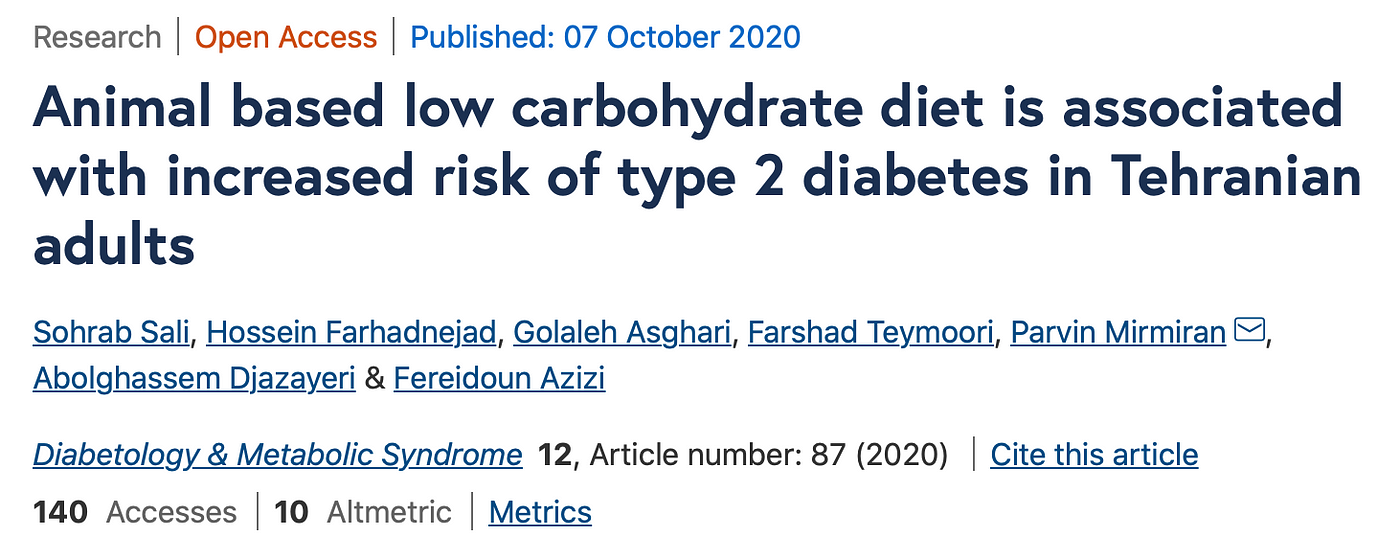
LOW CARBOHYDRATE DIET AND TYPE 2 DIABETES: The low carb diet continues to be promoted amongst healthcare professionals, predominantly for weight loss and management of type 2 diabetes. Although the short term effects can appear promising, the long term impact on health is cause for concern, especially when healthy carbohydrate-rich foods such as beans and whole grains are avoided and replaced by animal sources of fat and protein. Studies have clearly shown that diets high in animal protein and fat and low in whole plant foods increase the risk of dying, including from cardiovascular disease and cancer.
This study from Iran investigated the association of a low carb diet on the risk of type 2 diabetes. The study followed 4356 healthy participants with a median age of 40.5 years for 3 years. Dietary intakes were analysed and the low carb diet score calculated according to each of carbohydrate, protein, and total fat as a percentage of energy intakes. The low carb diet score ranged from 0 (the lowest fat and protein intakes and the highest carbohydrate intakes) to 30 (the highest protein and fat intakes and the lowest carbohydrate intakes). The animal-based low-carb score (based on the percentage of energy from carbohydrate, animal protein, and animal fat) and plant-based low-carb score (according to the percentage of energy from carbohydrate, vegetable protein, and vegetable fat) were also calculated. The participants were divided into quartiles based on the low carb score. The difference between the highest and lowest intakes of carbohydrates was 64.7% vs 46.8% (% of calories). Diabetes was defined according to the criteria of the American Diabetes Association.
The results showed that after 3 years of follow up there were 123 (2.8%) new cases of type 2 diabetes. There was a significant positive association between the low-carb score and risk of diabetes. After adjusting for a number of confounding factors, the highest quartile of low carb score had a 2.16 times greater risk of diabetes than the lowest quartile. The higher score of animal-based low-carb diet was associated with an 81% increased risk of type 2 diabetes. A low carb plant-based diet did not increase the risk of type 2 diabetes.
The authors conclude ‘The current study provided evidence that greater adherence to a low carb diet was significantly associated with an increased risk of diabetes, especially based on high intakes of protein and fat with an animal source’.
These data are consistent from studies from Europe and North America that have also found negative health impacts of a low carb dietary pattern when animal-based foods are emphasised. There are so many reasons why an animal-rich diet increases the risk of type 2 diabetes and I have summarised the evidence in a previous article on the topic. Although the optimal proportion of macronutrients in the diet is still a matter of debates, if you want to follow a lower carbohydrate diet its best to do this within the context of an overall plant-based dietary pattern. This type of low carb diet has been termed Eco-Atkins and may have some cardiometabolic benefits.

PLANT BASED DIETS FOR KIDNEY DISEASE: This is a phenomenal contribution to the literature by fellow plant-based physicians.
The topic of plant-based diets (PBD) for kidney disease has not been discussed enough and continues to be clouded by prevailing myths. This paper brings us right up to date and it is clear that PBDs should be front and centre of a lifestyle approach to maintaining kidney health.
Why? PBDs prevent the very causes of kidney failure — hypertension and type 2 diabetes. If you have established kidney failure, PBDs will slow the progression because of its lower acid load, lower protein and higher fibre content. All these factors reduce the load/strain on the kidneys. PBDs reduce the level of uraemic toxins, promote a healthy gut microbiome and reduce inflammation.
If you have established kidney disease, fruits and vegetables can be as beneficial or more so than sodium bicarbonate to reduce acid load and PBDs may help prevent the need for dialysis. The concerns about high potassium and phosphate and low protein in PBDs have been overstated and with some adjustments, PBDs can be suitable for those on dialysis too.
All in all, this paper should be practice changing around the world. Of course, any diet change in a patient with kidney disease should be supported by a specialist dietitian or healthcare professional. Please read the full paper, which is free online.
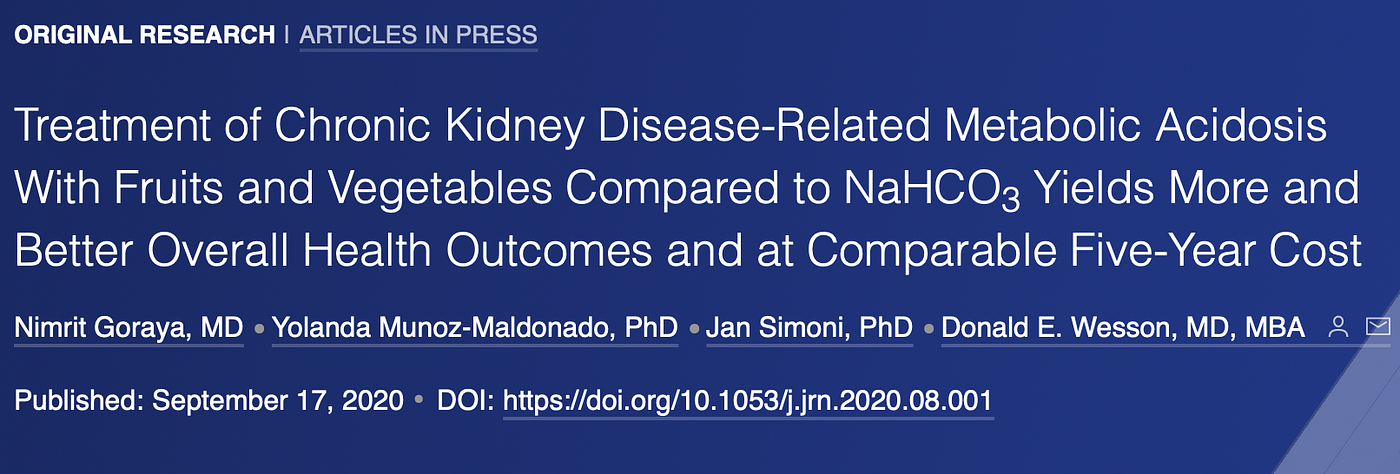
FRUITS AND VEGETABLES FOR METABOLIC ACIDOSIS IN KIDNEY FAILURE: This study supports the practice paper above and investigates the use of fruits and vegetables as a means of controlling metabolic acidosis in kidney failure. Fruits and vegetables are naturally alkali, in contrast to animal-derived foods which are rich in sulpher-containing amino acids that are acid forming. In this study, 108 patients with stage 3 chronic kidney disease were randomised into 3 groups; fruits and vegetables, oral sodium bicarbonate or usual care; with 36 participants in each group. In addition to measuring the degree of acidosis, the study also assessed the number of participants with cardiovascular disease events (myocardial infarctions + strokes) and group medication and hospitalization costs. The investigators provided all the fruits and vegetables to the participants and to their family members so that participants would not share their portions. Fruit were predominantly as apples, apricots, oranges, peaches, pears, raisins, and strawberries. Vegetables were predominantly as carrots, cauliflower, eggplant, lettuce, potatoes, spinach, tomatoes, and zucchini. Participants received no specific diet instructions and could integrate the provided fruits and vegetables into their diets as they wished. A dietitian prescribed the necessary amount of fruits and vegetables that was distributed from a community food bank and averaged 2–4 cups daily, depending on the base-producing capacity to assure that each participant received sufficient to reduce their baseline dietary acid by half.
The results showed no difference between the degree of acidosis between the fruit and vegetable treatment group and the sodium bicarbonate group suggesting that fruits and vegetables were as good a treatment as medication. In contrast, the usual care group had a worsening of acidosis. In addition, the fruit and vegetables group had a lower incidence of cardiovascular events. Treatment of metabolic acidosis with fruits and vegetables compared to sodium bicarbonate was associated with lower blood pressure and lower LDL-cholesterol, with fewer medications and doses of medication needed to achieve comparable benefits. These lower medication costs offset the higher cost of the fruit and vegetables intervention resulting in no addition cost per houshold. The fruit and vegetables group had a significantly lower incidence of cardiovascular events.
These results, supported by prior data, should result in a practice change amongst the renal community. Fruits and vegetables should be the first line intervention for prevention and management of metabolic acidosis in kidney disease.
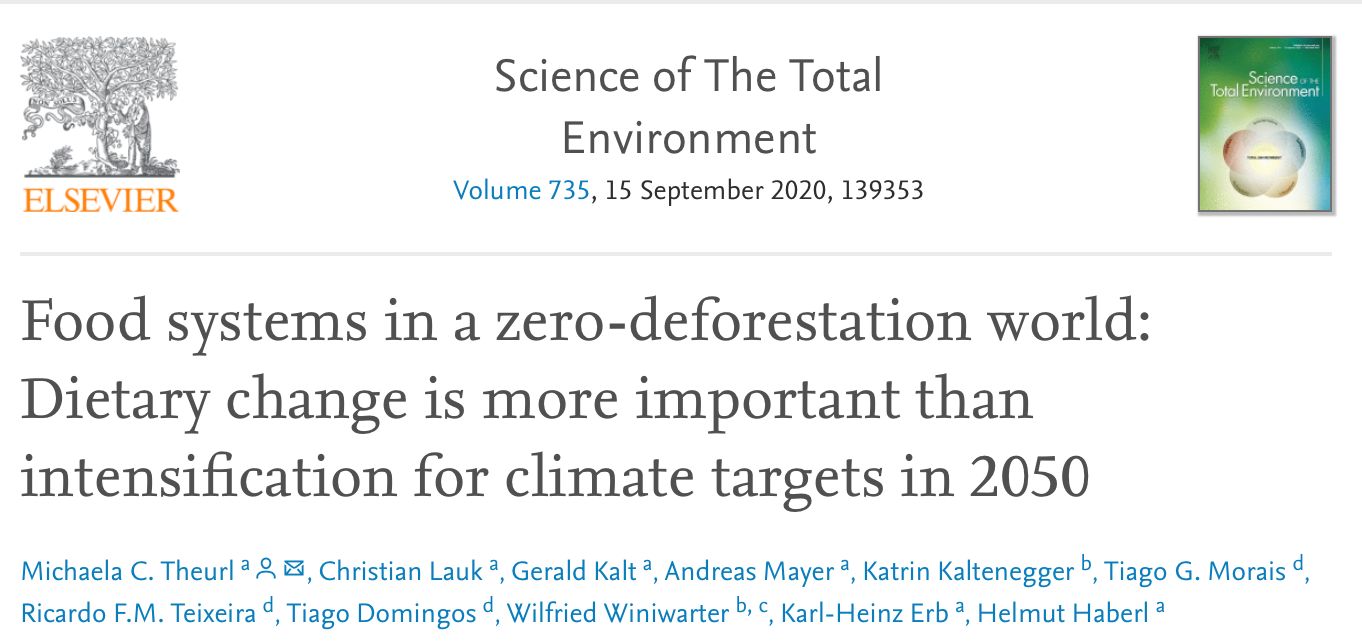
DIET AND GREEN HOUSE GAS EMISSIONS: The global food system is a major contributor to climate change and ecological collapse, predominately due to the expansion of animal agriculture and its contribution to greenhouse gas (GHG) emissions, water use and pollution, land use change, deforestation, loss of biodiversity and so forth. The scientific community are clear that a shift to a plant-based diet is essential to mitigate the impacts of our food system on the climate. This is yet another study demonstrating the benefits of adopting a vegan diet when compared to other diet patterns. The study considered 5 different diet scenarios and their impact on GHG emission, land use and carbon storage by 2050. The diet patterns were RICH: calorie-rich diet, BAU: business-as usual diet, MEAT: healthy meat diet, VEGET: healthy vegetarian diet, VEGAN: healthy vegan diet. The results show that today’s business-as-usual and meat dominant diets would have the highest GHG emissions out of any dietary scenario, especially if focussed on ruminant meat and milk. Adoption of a vegetarian diet helps, but does not guarantee low GHG emissions. The lowest emissions were found for vegan diets. The authors conclude ‘Our results suggest that the choice and composition of future diets is highly important for GHG emissions of the food system, as well as for society-climate interaction in its entirety. A change in dietary demand has a large effect on sparing areas and can substantially help to increase carbon uptake through vegetation regrowth’.
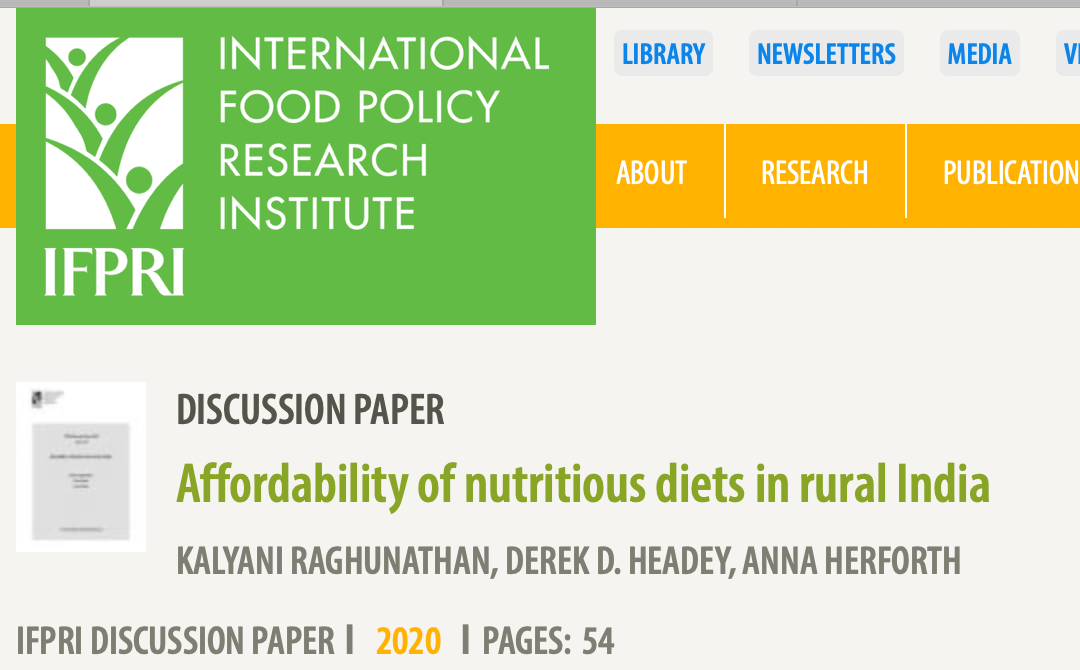
FOOD AS A HUMAN RIGHT: This report makes for very upsetting reading. The provision and access to healthy, nutritious food should be acknowledged as a basic human right. Malnutrition, due to food insecurity, is still a major problem around the world, including in India. This report highlights that for most people in India a healthy diet is unaffordable. The cost of a healthy diet requires 50–60% of male and about 70–80% of female daily wages and the report estimates that that 45–64% of the rural poor, that is around 387.5 million people, cannot afford a nutritious diet that meets India’s national food-based dietary guidelines. The inequality of access to healthy food was also highlighted in this years Global Nutrition Report. Sadly, the UK also have an issue with access to healthy foods, which I highlighted in a previous news review based on a report from the The Food Foundation. The report finds that the poorest 20% of UK households would need to spend 39% of their disposable income on food to meet Eatwell Guide costs. Given that the world produced enough food to feed at least 10 billion people, food justice needs to be a priority.
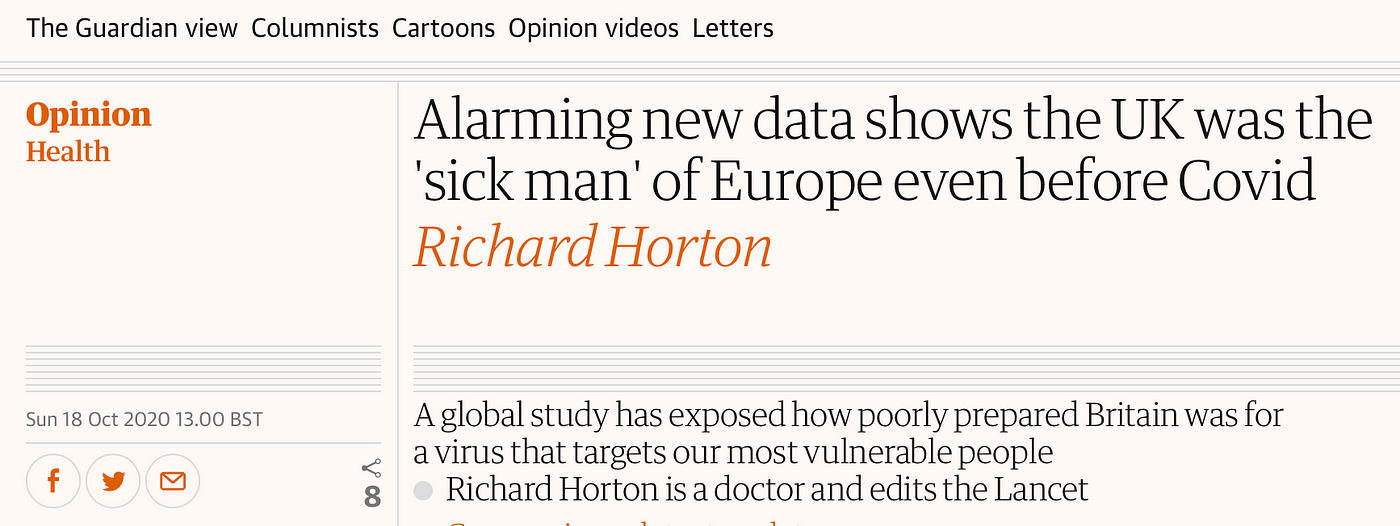
GLOBAL BURDEN OF DISEASE STUDY 2019: This week the Lancet has published a series of papers from the Global Burden of Disease Study reporting trends in health outcomes, a diverse set of risk factors, and health system responses from 204 countries and territories. There are a number of important findings, although many are not a surprise. Socioeconomic factors remain a major determinant of health outcomes. The major health concerns in virtually every country are now dominated by non-communicable diseases (NCDs). Public health policies are failing to curb the rise in risk factors leading to these NCDs. Among the 15 leading risk factors, those that continue to increase in prevelance are high systolic blood pressure, high fasting plasma glucose, high body-mass index, air pollution, alcohol and drug use. High blood pressure, smoking and dietary risk factors are the top 3 leading causes of NCDs. Alarmingly, the mortality decreases in cardiovascular diseases of the past half a century have slowed substantially, or even reversed in some countries.
Richard Horton, editor of the Lancet, writes a scathing summary of the health of the UK in the Guardian based on these study results. Although life expectancy has improved from 68.9 years in 1950 to 81.1 years in 2019, it is on average 1 year less than the rest of Europe. Importantly, healthy life expectancy is only 68.9 years meaning that people in the UK spend an average 12.2 years living with some kind of illness. The main causes of poor health are NCDs, type 2 diabetes, dementia, chronic respiratory diseases, and alcohol and drug use continues to increase. Shockingly, socioeconomic determinants of health continue to play a major role in determining life expectancy with an 8 year diference between the North and South of the UK. Life expectancy is highest in Richmond at 84.5 years and lowest in Blackpool at 76.4 years. The lowest life expectancy in the UK is worse than the average for China, Turkey, Thailand, Cuba, Chile, Jordan and even the US. Richard Horton notes how COVID-19 has only further highlighted these disparities in health outcomes, with the least healthy communities with the lowest life expectancy affected the most.
We need to do better in the UK and across the globe. The right to a long healthy, disease-free life should be the basis of all Government policies and this should not be dependent on your socioeconomic status.
If you have found this article useful, please follow my organisation ‘plant-based health professionals UK’ on Instagram @plantbasedhealthprofessionals and facebook. You can support our work by joining as a member or making a donation via the website.
